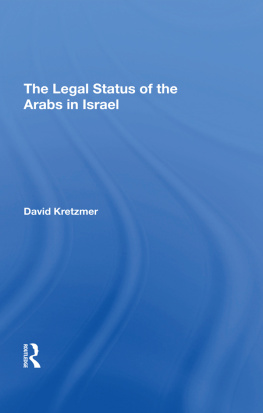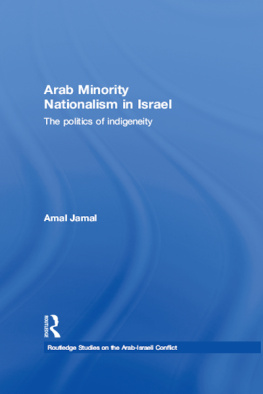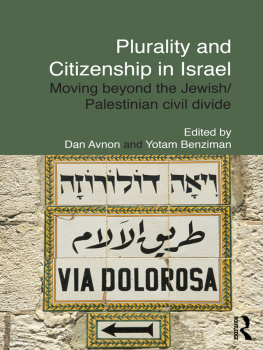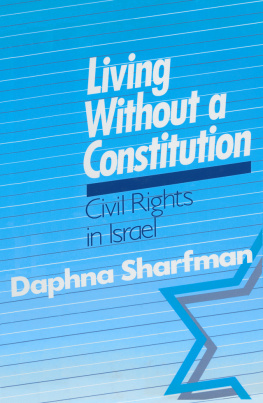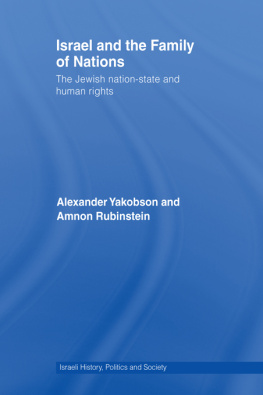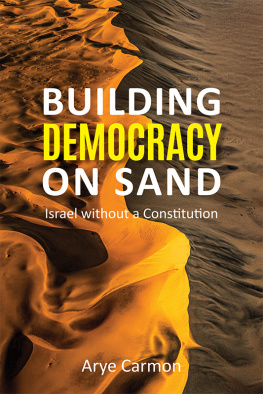The Legal Status of the Arabs in Israel
Published in cooperation with the International Center for Peace in the Middle East, Tel Aviv
The International Center for Peace in the Middle East (ICPME) gratefully acknowledges the Ford Foundation for making this project possible. The views expressed in the publications of the ICPME are those of the authors and do not necessarily reflect the views of the trustees, officers, or staff of the ICPME.
The Status and Condition of the Arabs in Israel A project under the direction of Professor Henry Rosenfeld
The 750,000 Israeli Arabs are a national minority making up 17 percent of the population of Israel. In 1987 the International Center for Peace in the Middle East, together with Professor Henry Rosenfeld, director of the project, initiated a comprehensive research project on the status and condition of the Arabs in Israel. The focus of the research is on the Arabs legal status, health and social services, and local authority in Arab communities. The books prepared by the project members report the empirical findings from the project and offer a penetrating analysis of the degree of social, economic, and political integration between Arabs and Jews, the extent of discrimination, and the degree to which rights and opportunities are shared by all.
The Legal Status of the Arabs in Israel
David Kretzmer
This study examines how the Israeli legal system copes with two major issues. The first is the tension between the constitutional definition of Israel as both a Jewish state and a democracy committed to equal rights for all of its citizens. The second issue is the delicate position of a national minority in a state that since its establishment has been involved in a bitter conflict with the Palestinian nation to which that minority belongs.
David Kretzmer holds the Louis Marshall Chair of Environmental Law at The Hebrew University, Jerusalem.
First published 1990 by Westview Press
Published 2019 by Routledge
52 Vanderbilt Avenue, New York, NY 10017
2 Park Square, Milton Park, Abingdon, Oxon OX14 4RN
Routledge is an imprint of the Taylor & Francis Group, an informa business
Copyright 1990 Taylor & Francis
All rights reserved. No part of this book may be reprinted or reproduced or utilised in any form or by any electronic, mechanical, or other means, now known or hereafter invented, including photocopying and recording, or in any information storage or retrieval system, without permission in writing from the publishers.
Notice:
Product or corporate names may be trademarks or registered trademarks, and are used only for identification and explanation without intent to infringe
Library of Congress Cataloging-in-Publication Data
Kretzmer, David.
The legal status of the Arabs in Israel.
(Westview special studies on the Middle East)
1. Palestinian ArabsLegal status, laws, etc.Israel.
2. Palestinian ArabsIsrael. 3. IsraelEthnic rela
tions. I. Title. II. Series.
LAW 342.56940873 89-25115
345.69402873
ISBN 13: 978-0-367-29348-2 (hbk)
Dedication
This study is dedicated to the memory of my friend and colleague, Chamman P. Shelach, his wife, liana, and daughter, Zelil, who were murdered at Ras Burka in October, 1985. The questions discussed in the study were always of paramount interest to Chamman. Had he been alive there is little doubt that the writer would have benefited from his insights.
The law is only one, and not necessarily the most important, of the factors that determine the status of a national, ethnic or religious group in any given society. Furthermore, the law itself is not an isolated and self contained phenomenon unaffected by social, economic and political ideologies, interests and attitudes. On the contrary, it reflects such ideologies, interests and attitudes. Nevertheless, the law does exist as an autonomous discipline, and it may be described and analyzed as such without explicitly exposing and examining the social, economic and political factors that lie behind it. The main purpose of this study is to provide such a description and analysis of the legal status of Israels Arab minority.
This study grew out of a report that was originally prepared as part of a wide-ranging research project on Israels Arab minority. The project, directed by Henry Rosenfeld, is funded by a Ford Foundation grant administered by the International Center for Peace in the Middle East. Each part of the project is limited to one aspect of the general topic and makes no attempt to present a complete picture of the position of Arabs in Israeli society. The reader who wishes to gain a more complete picture of the Arabs status in Israel should read all the studies which have been or will be published.
The emphasis in this study is on the current legal status of Israels Arab minority. While the history of various legislative and other legal arrangements is sometimes highly relevant in this analysis, historical developments that have no direct bearing on the current situation have not been examined in any detail. Thus, certain legal arrangements which were crucial at certain stages in determining the relationship of the organs of state towards its Arab citizens, but are no longer prevalent, are not discussed. The main example is the system of military government which was imposed in most of the areas in which Arabs resided from 1948 until 1966.
Since the Six Day War of June 1967, most attention regarding the conflict between Israel and the Palestinian Arabs has been devoted to the status and political future of the Palestinians resident in the areas occupied by Israel in the course of that war, as well as Palestinians residing outside those territories. This study does not deal with this issue, but is confined to the status of the Arabs who reside within the pre-1967borders of Israel.
Osama Halabi served as my research assistant in preparing the original report. He deserves credit and thanks for his very able research. Itzchak Zamir, Frances Raday, Henry Steiner, Elia Zureik, Pnina Lahav, Miri Gur-Arye, Stan Cohen and Menachem Hofnung read drafts of the original report, or parts thereof, and were kind enough to comment thereon. Special thanks and appreciation go to Ruth Gavison, whose advice and encouragement were invaluable. Judith Fattal did an excellent job in preparing the manuscript for printing. It goes without saying that the willingness of friends and colleagues to read and comment on the study implies neither agreement with the general approach of the study nor acceptance of the views expressed therein. Responsibility for those rests with the author alone.
Last, but not least, Id like to thank my wife, Marcia, for her editorial assistance and continuous support, and my children Yoel, Hava and Yonatan Yaakov for their patience with a father who spends so much time at his word processor.
David Kretzmer
Jerusalem
The Declaration on the Establishment of the State of Israel of 14 May, 1948 contains three statements that are central in analyzing the legal status of Israels Arab minority. First, the state was established not merely as a new governmental apparatus to replace that of the departing British Mandatory regime. It was declared to be a Jewish state in Eretz Israel that would open its doors to every Jew and grant the Jewish people the status of a nation with equal rights among the family of nations. At the same time, the new state promised that it would develop the country for the benefit of all its inhabitants, and that it would maintain complete equality of political and social rights of all its citizens, irrespective of race, religion or sex. Finally, the Declaration included an appeal, in the midst of the onslaught which has been continuing against us for months, to the Arabs resident in the State of Israel to preserve the peace and to take part in the building of the state on the footing of full and equal nationality and appropriate representation in all its organs.

